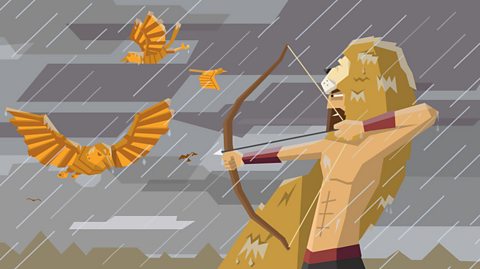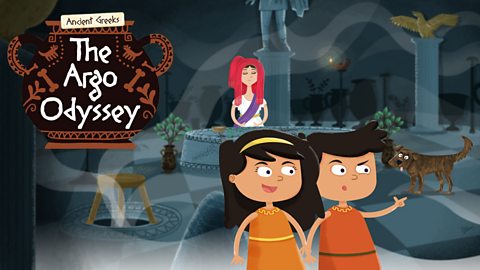How did Greek ideas spread so far?
Even after 3,000 years, we're still using ancient Greek ideas in maths, science and art.
Our alphabet is based on the Greek one. Hundreds of words we use come from the Greek language.
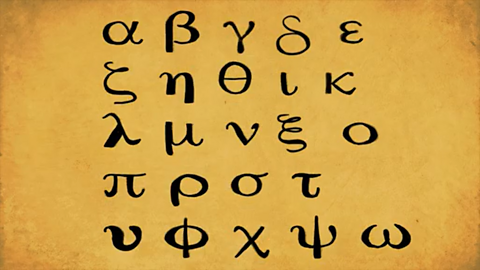
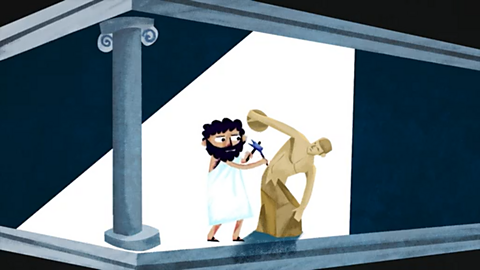
ItÔÇÖs all down to a young king called Alexander.
He led his army to take over Greece, Persia, Egypt and even part of India.
He ruled so much of the world they called him ÔÇśAlexander the GreatÔÇÖ.
Wherever he went, Alexander took Greek ideas.
After he died, the Romans took over. They liked the Greeks' way of life and carried Greek ideas to even more countries - including ours!

Watch: What did the ancient Greeks do for us?
Many of the things that make the UK a really cool place to live were actually invented by the Greeks ÔÇô we just copied them.
OK, we didnÔÇÖt copy everything. But letÔÇÖs give them a bit of credit anyway. First off the Greeks gave the world democracy ÔÇô which we still use in Britain today to choose who runs the country.
In ancient Athens, citizens met regularly to vote on the laws that changed their daily lives using a simple show of hands by all.
I say allÔÇŽ women, slaves and foreigners were banned from voting. So NOT so democratic really!
The Greeks also gave us the Olympic Games. The very first Olympics took place in 776BC.
The only event was a 200m foot race and the winner was a humble baker named Coroebus.
As time went on the Greeks added more events making it more like the Olympics we know today.
The big difference being that the Greeks did it all in the nude!
The Greeks pretty much invented modern mathematics, sculpture, philosophy, science and even medicine.
And they used some of their new knowledge to make inventions like the water wheel, the alarm clock, the catapult and even, the vending machine!
Finally, our language has roots in ancient Greece, from the individual letters through to complete words like dinosaur and helicopter!
So, whether we are talking about language, science, maths, law, building, sport, art or annoyingly early wake up calls ÔÇô the Greeks got there first.
Did the Greeks invent government?
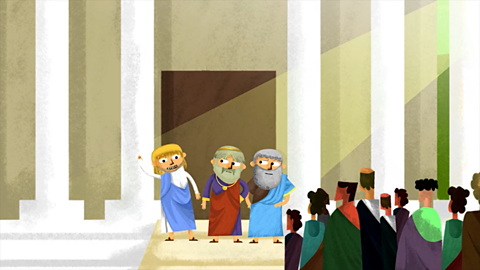
- In ancient Athens, citizens would gather together on a dusty hill called the Pnyx.
- Here they would decide the cityÔÇÖs laws and who should be on its ruling council.
- This was ÔÇśdemocracyÔÇÖ or ÔÇśrule by the peopleÔÇÖ.
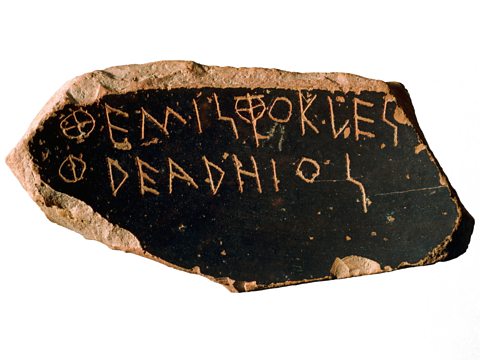
All 30,000 citizens were men. Women and enslaved people didn't get a say.
A citizen could speak for the time it took water to run from one jar into another. When this water clock ran out, it was someone elseÔÇÖs turn.
Men could write a name on a broken bit of pottery called an ÔÇśo▓§│┘░¨▓╣│Ž┤ă▓ďÔÇÖ. Anyone named more than 600 times got kicked out of the city.
Today, we also live in a democracy. Unlike in ancient Greece, women get to vote, too. Juries decide if someone is guilty of a crime - we donÔÇÖt use ostracons anymore!

How did the Greeks change sport?
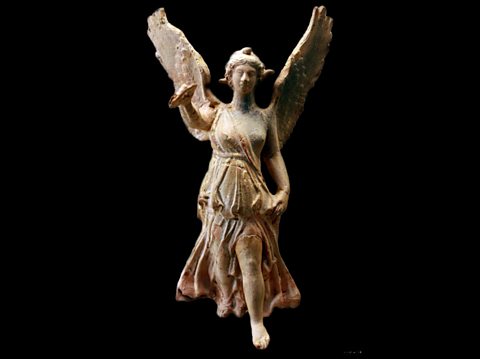
- The Greeks loved sport as much as we do. They enjoyed the discus, javelin, long jump, boxing and horse racing.
- Athletes prayed to Nike, the goddess of victory - sheÔÇÖs still a big name in sport today!
- The Greeks loved to watch races in a big, open-air ÔÇśstadionÔÇÖ, very like a modern sports stadium.
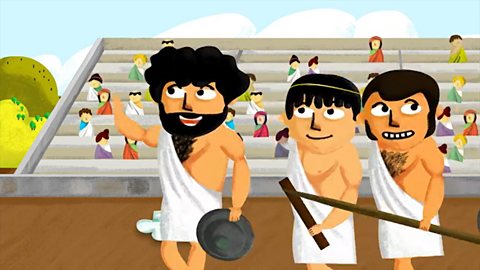
Greek men and boys trained in a gymnasium. We also go to the gym, although today women and girls are welcome too.
Every four years the Greeks held a special sporting festival at Olympia - the Olympic Games.
These inspired the modern Olympics which began in 1896. Some of the events were very similar. Like the Greeks, we also hold the Olympics every four years.
Legend tells of Pheidippides, who fought at the battle of Marathon. When the Greeks won, he ran 26 miles (42 km) to Athens with the news ÔÇô and then fell down dead. Modern marathon races cover the same distance as his epic run.

Famous Greek scientists, philosophers and writers
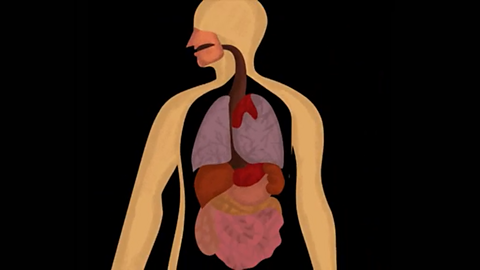
- Ancient Greek thinkers made big discoveries. Hippocrates was famous for his ideas about medicine.
- Doctors still take a Hippocratic Oath, swearing they will be honest and truthful.
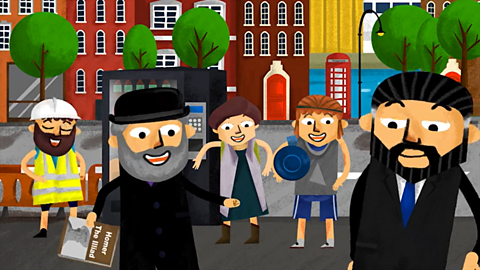
Sappho was a famous Greek poet. What we have left of her poetry is still read today.
Herodotus wrote a history of the Greeks. He used eyewitness reports to write it, something todayÔÇÖs historians also try to do.
Socrates and Plato were philosophers. They asked, ÔÇťWhat is a good life?ÔÇŁ and ÔÇťHow do we think?ÔÇŁ Philosophers in our time also try to answer these questions.

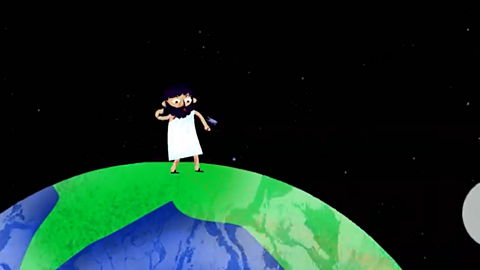
Aristotle studied plants, animals and rocks. He carried out experiments to find out about the world we live in. Modern scientists do the same kind of thing.
Ancient Greek stories are still told today. We love films about superheroes and monsters. Our TV soaps are full of stories about long-lost children returning to find their parents - just as ancient Greek plays were.
Watch: Dick and Dom discover Archimedes
Dick and Dom discover the work of Archimedes, one of the greatest Greek thinkers.
Dick: Ah, you join me in the bath where we go inside one of the greatest scientific minds this world has ever seen.He was famous for coming up with the genius idea whilst in the bath. Not only was he a fantastic mathematician and engineer but his genius machines are still being used today.
Dom: He did all of this over 2000 years ago.
Dick: Why are you in my bath?
Dom: I, I, I donÔÇÖt know.
Dick: Ladies and gentlemen we give you, Archimedes.
Archimedes: Why are you in his bath, Dom?
Dick: Archimedes was a Greek guy with a great beard. Born a ridiculously long time ago around the year 287BC.
Dom: Archimedes was a genius when it came to maths, physics and engineering. He was so clever, he was hired to solve tricky problems by the King of Syracuse.
Dick: He came up with the brilliant theories about why objects float and he built amazing machines to help defend the kingÔÇÖs city against attack.
You might know the story of Archimedes being in a bath and coming up with a fantastic idea that helped him solve a problem that had been puzzling him for ages.
Dom: He was so excited about solving this problem that he jumped out of the bath, nudey, shouting ÔÇśEureka, eureka!ÔÇÖ
Dick: In Greek, that means ÔÇśIÔÇÖve got it, IÔÇÖve got it!ÔÇÖ
Dom: But what exactly had he got?
Dick: If only Fran, our genius scientist was here to tell us more.
Fran: So Archimedes was working on a problem that had been set by the king because the king didnÔÇÖt know whether his crown was made of pure gold or not.
Dom: So it was at that moment in the bath that Archimedes solved the problem.
Fran: Yeah.
Dick: But why did he get so excited about that?
Fran: Well, the thing is, his solution didnÔÇÖt just allow him to work out whether crowns were made out of pure gold or not, it allowed him to figure out why things float and why things sink and that is much more useful. Come with me.
Dom: I mean, weÔÇÖre not complaining or anything Fran but whatÔÇÖs all this got to do with Archimedes?
Fran: He knew that different materials could weigh the same but you get different amounts of material for that same weight.
Dom: So what youÔÇÖre saying is, basically you get some light and fluffy marshmellows , you get loads of them for 100g.
Fran: Yeah.
Dick: Ah, but only a few aniseed balls.
Fran: Exactly, and Archimedes figured out that the more of a material you get for that certain weight, the more likely it is to float.If you donÔÇÖt believe me, letÔÇÖs try it.
Dick: Ah, sinkage.
Dom: Sinkage. SoÔÇŽ There you are. Floating!
Dick: Ah, eureka!
Dom: Eureka!
Archimedes: IÔÇÖll say!
Dick: Until Archimedes came along more than 2000 years ago, building ship that would float well was always a trial and error operation.
Dom: I mean thereÔÇÖs no doubt Archimedes was a really clever bloke.
Dick: Look thereÔÇÖs something else here. ÔÇśHe set to catch the full rays of the sun at noon.ÔÇÖ HeÔÇÖs saying here that he set fire to boats.2000 years ago Archimedes made a special heat ray to defend his city walls against attack from Roman ships.
By cleverly positioning mirrors, Archimedes caught the sunÔÇÖs rays and concentrated them to make one amazingly hot heat ray.
Fran: IÔÇÖve actually got a specially shaped mirror here for you.
Dom: What can we set on fire?
Fran: I donÔÇÖt know.
Dick: Ah, just like Archimedes did.
Dom: What?
Dick: LetÔÇÖs set fire to a boat.
Dom: Where are you going to find a big red boat ÔÇô
Dick: There, there.
Dom: Oh.
Fran: Right in you come. Pop your safety specs on because what weÔÇÖve got here is a heat lamp. And weÔÇÖre going to use this along with this other mirror as our artificial sun.
Dom: So thatÔÇÖs kind of like your sun and this is the reflector which is gonna be generating the heat etc yes?
Fran: Yeah.
Dom: Well we canÔÇÖt exactly set fire to a boat in here though can we?
Fran: Well no. ThatÔÇÖs why IÔÇÖve got two other things to show you. Firstly this stuff, fuse wire and that we can ignite in here but then thatÔÇÖll take the flame outside where we can light the boat at a safe distance. IÔÇÖve also got this stuff.
Dick: What? Cotton wool?
Dom: No, no, no. This is flash wool. You know. You remember me using this stuff as a magician. It just bursts into flames and then disappears.
Fran: Yeah like this.
Dom: ŞÚ▒▓╣╗ň▓ÔÔÇŽ
Dick: ThatÔÇÖs my │╔╚╦┬█╠│ pass.
Dom: Oh right. Now, donÔÇÖt copy this at home. WeÔÇÖre doing this as a controlled experiment but setting fire to stuff in your back garden is a no-no.
Dick: In three, two, one, go.
BANG
Dick: Ah!
Dom: Woah! ItÔÇÖs alight! There she goes, slowly and steadily to the boat down there but whatÔÇÖs in the boat?
Dick: IÔÇÖll tell you whatÔÇÖs in the boat. A nice combustible bag of tricks.
Dom: This is finally itÔÇŽ or is it? That boatÔÇÖs absolutely fine. A failed experiment. No bangs, flashes, whooshes.
Dick: F,f,f, FIRE!
Dom: Eureka! WeÔÇÖve done it.
Dick: Archimedes, you are an absolute genius.
Activities
Activity 1: Famous ancient Greeks
Click on the figures below to hear more about their lives.
Activity 2: Quiz ÔÇô Greek discoveries
Game: The Argo Odyssey
Argo the dog is missing! He was last seen by the mysterious Oracle of Delphi.
Play the game to match items and find out how the Ancient Greeks changed the world.
Bitesize Primary games. gameBitesize Primary games
Play fun and educational primary games in science, maths, English, history, geography, art, computing and modern languages.

More on Ancient Greece
Find out more by working through a topic
- count8 of 15
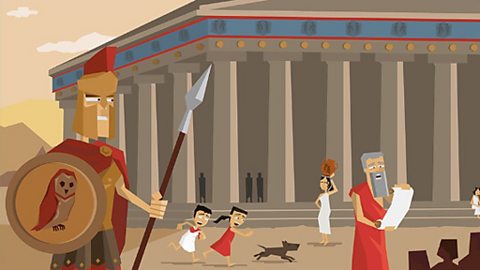
- count9 of 15
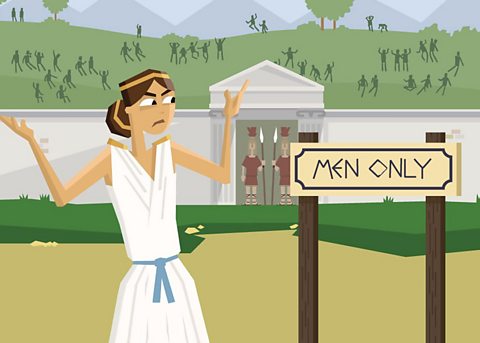
- count10 of 15
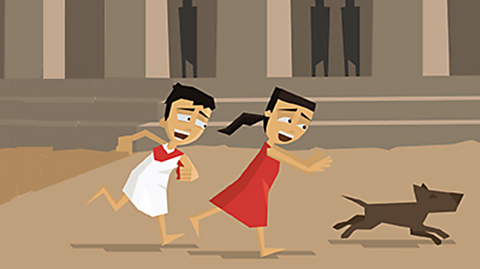
- count11 of 15
